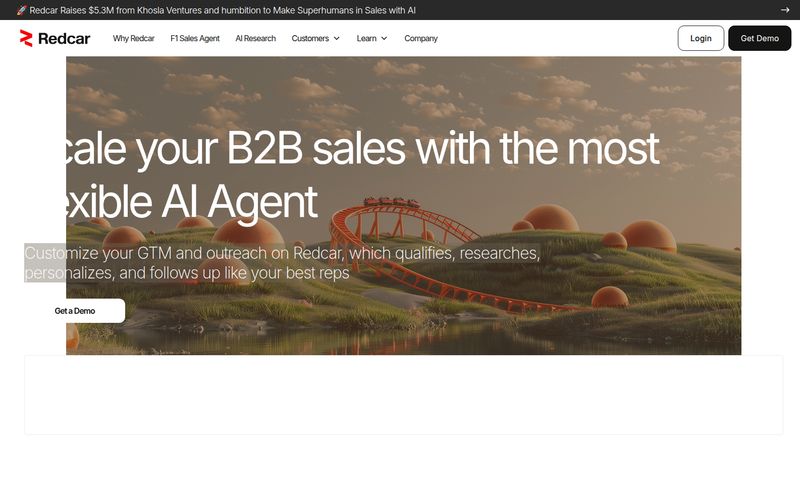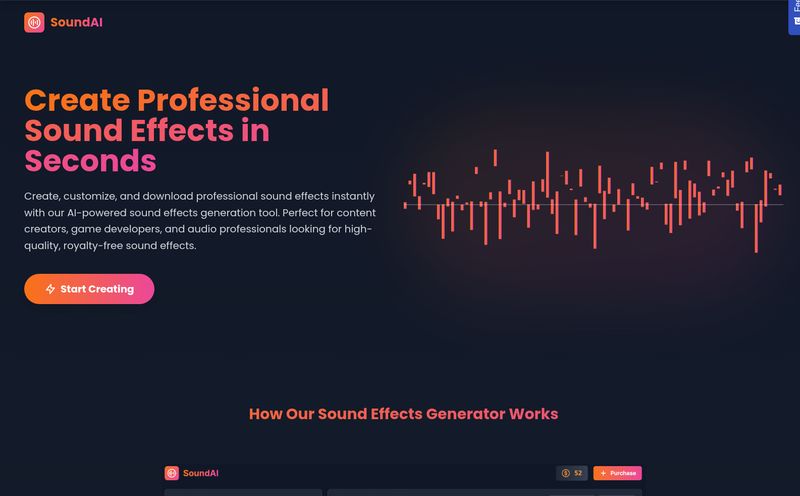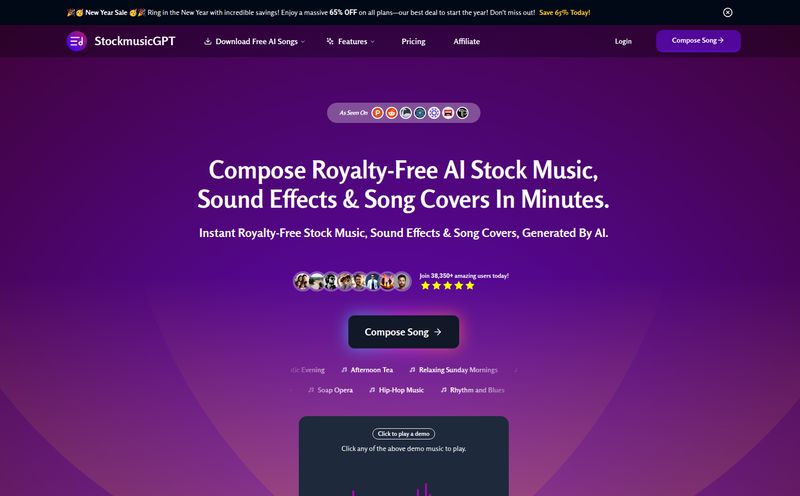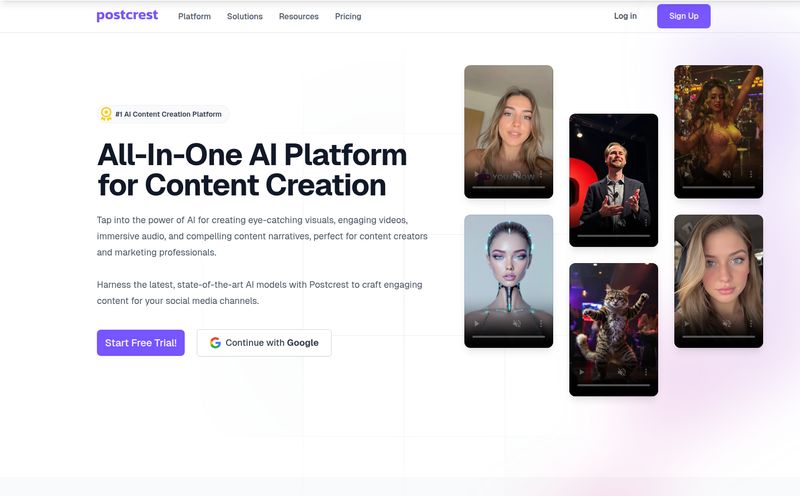As someone who has spent years neck-deep in the creator world, I've seen it all. I’ve spent more hours than I'd like to admit scrolling through endless libraries of 'upbeat corporate' stock music, trying to find a track that doesn’t sound like it was made for a 2008 PowerPoint presentation. The struggle is real. You either pay a small fortune for a custom track, settle for something generic, or risk a copyright strike. It’s a constant headache.
Then along comes the AI wave. We've seen it with images (hello, Midjourney rabbit hole), we've seen it with text. It was only a matter of time before it came for our ears. And honestly, I’ve been a bit of a skeptic. Could an algorithm really capture the feel of music? The soul? Well, I recently stumbled upon a platform called CassetteAI, and my curiosity got the best of me. I had to see for myself.
So, What on Earth is CassetteAI?
In the simplest terms, CassetteAI is an AI music generator. But that’s a bit like calling a smartphone a 'pocket calculator'. It doesn’t quite capture the whole picture. You give it a text prompt—a description of the music you want to hear—and it spits out a completely original piece of audio. We’re talking beats, melodies, instrumentals, sound effects, even vocals.
Think of it like having a composer, a session musician, and a sound engineer all on standby, ready to create whatever you can imagine, just by typing a few words. Want a “lo-fi hip-hop beat with a melancholic piano melody, perfect for studying on a rainy day”? Type it in. How about “epic cinematic trailer music with soaring strings and powerful war drums”? Go for it. The goal here seems to be making music creation accessible to everyone, from a seasoned producer looking for inspiration to a YouTuber who doesn't know a C-major scale from a C-clamp.
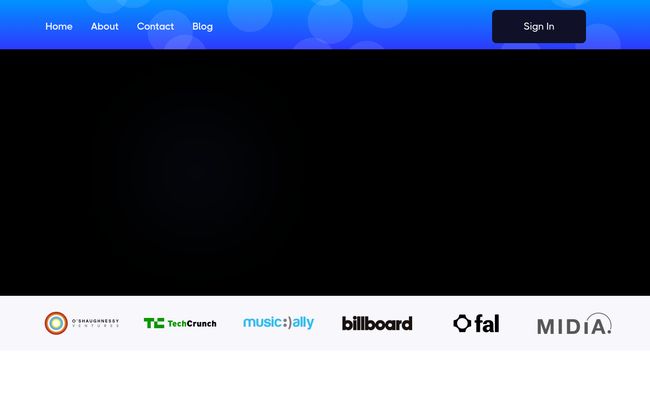
Visit CassetteAI
How Does This AI Music Magic Actually Work?
Without getting too lost in the technical weeds, CassetteAI runs on something called Latent Diffusion Models (LDMs). If you’ve played with AI image generators, this might sound familiar. It’s a similar concept. The AI has been trained on a massive amount of musical data, learning the patterns, structures, and relationships between different sounds, genres, and moods. When you give it a prompt, it's not just mashing random sounds together. It’s using that learned 'knowledge' to generate a new piece of music that matches your description.
Of course, this means the prompt is everything. This is where the human element comes back in. Learning to write a good prompt is a bit of an art form in itself. You have to be specific but not too restrictive. It takes some experimentation, a bit of trial and error. But when you get it right? It feels like you’ve just conducted an invisible orchestra.
The Standout Features That Caught My Eye
A lot of AI tools do one thing well. This one seems to be aiming for a more complete package, which, I have to admit, is pretty appealing.
More Than Just a Beat Maker
This was the first thing that impressed me. It's not just about generating a simple drum loop. The ability to generate instrumentals, sound effects (SFX), and even vocals within one platform is a big deal. For a podcaster, this means you could theoretically create your intro music, a transition sound effect, and an outro jingle all in the same place. For an indie game developer, it's a potential one-stop-shop for background music and environmental sounds. That integration saves a ton of time.
The Power to Tweak and Tinker: MIDI & Stems
Now this is for my fellow control freaks and music producers. One of my biggest fears with AI music has always been getting a great-sounding track that’s just one file. A baked-in MP3 or WAV that you can’t change. CassetteAI seems to understand this pain point by offering MIDI conversion and stem separation. This is huge. Getting the MIDI data means you can take the melody or chord progression generated by the AI and assign it to any instrument you own in your own Digital Audio Workstation (DAW) like Ableton or Logic. Stem separation lets you break the track down into its individual parts—drums, bass, melody, etc. This gives you immense control to remix, re-arrange, and truly make the track your own. Its a game-changer.
An All-in-One AI Editing Studio
Having an AI editing studio built-in is another smart move. It lowers the barrier to entry. You don’t need to immediately export everything to a complicated piece of software just to make a few small changes. Being able to tweak and refine your creation right there on the platform makes the whole process feel much more fluid and intuitive.
The Good, The Bad, and The AI-Generated
No tool is perfect, right? Especially in a field that's moving this fast. I think it’s important to be realistic about what you're getting. On one hand, CassetteAI opens up a world of creative possibilities. The idea that anyone can now create a custom soundtrack is genuinely exciting. It puts a powerful tool in the hands of so many people who were previously locked out. And the fact that you get complete control and ownership over what you create is a massive plus for any serious creator concerned with copyright.
But there's another side to it. The quality of the output is entirely dependent on the AI model and the prompt you feed it. Sometimes, you’ll get pure gold. Other times, you might get something a little… weird. Something that's technically music but lacks a certain spark. There's a definite learning curve to prompt-crafting, and it can lead to a bit of a reliance on the platform. It's a new kind of creative muscle you have to build. Some might argue that it removes the 'human touch', but I see it differently. I think it’s just a new kind of collaboration—between human intent and artificial execution.
What's the Damage? A Look at CassetteAI's Pricing
This is the million-dollar question, isn't it? As of my writing this, CassetteAI's website doesn't have a public pricing page. This isn't uncommon for new platforms, especially in tech. It could mean a few things: they might be in a beta testing phase, they could be finalizing their tiers, or they might be focusing on an enterprise model where you have to contact them for a quote.
My best guess, based on similar tools in the market, is that we'll likely see a freemium model emerge. Something like a free plan with a limited number of generations or lower-quality audio, and then paid tiers that offer more credits, higher fidelity, and advanced features like commercial use licenses. But for now, we’ll have to wait and see.
Who Should Give CassetteAI a Spin?
I can see a few groups of people getting a real kick out of this:
- Content Creators (YouTubers, Podcasters, Streamers): This is the most obvious one. Stop using the same three royalty-free songs as everyone else. Create unique, mood-fitting audio for your content.
- Indie Developers: Whether you're making a game or an app, custom sound design can make a huge difference. This could be an affordable way to get a unique soundtrack.
- Musicians & Producers: Don't look at it as a replacement, look at it as a partner for inspiration. Use it to break a creative block, generate a melody you wouldn't have thought of, or create some background textures for a larger piece.
- The Curious Hobbyist: If you've always wanted to make music but felt intimidated by the process, this is for you. It’s a fun, low-stakes way to play with sound and bring your ideas to life.
My Final Take
So, is CassetteAI the future of music? Maybe. Is it a threat to human artists? I really don't think so. A paintbrush didn't replace painters; it just gave them a new tool. I see CassetteAI in the same light. It's a fascinating, powerful, and genuinely useful tool that lowers the barrier to audio creation. It’s not going to write the next Grammy-winning album on its own, but it could very well be the spark that helps someone create their first-ever song, the perfect backing track for their viral video, or a beautiful score for their passion project. And that, in my book, is a pretty incredible thing.
Frequently Asked Questions About CassetteAI
- Do I own the music I make with CassetteAI?
- According to their platform's promises, yes. CassetteAI states that users get complete control and ownership over the music they generate, which is a significant advantage for creators who need to avoid copyright issues.
- Do I need to understand music theory to use it?
- Absolutely not. That’s one of its main appeals. If you can describe the music you want in words, you can use CassetteAI. It’s designed for beginners and professionals alike.
- Can I edit the music in my own software?
- Yes. With features like MIDI conversion and stem separation, you can export the core components of the AI-generated track and work with them in professional software like Ableton Live, Logic Pro X, or FL Studio.
- Is CassetteAI free to use?
- Currently, the pricing isn't publicly listed. It’s possible they have a free trial or are in a beta phase. It’s best to check their website directly for the most up-to-date information on plans and costs.
- What kinds of music can it generate?
- Pretty much anything you can describe. The variety is based on the text prompts you provide. You can ask for specific genres (like jazz, rock, EDM), moods (happy, sad, intense), or even combinations of instruments and styles.
- How is this different from other AI music tools out there?
- While there are other text-to-music tools, CassetteAI’s strength appears to be its all-in-one approach. The combination of instrumental generation, SFX, vocals, an integrated editing studio, and powerful export options like MIDI and stems makes it a very comprehensive package.
Reference and Sources
- CassetteAI Official Website
- Billboard: The AI Music Gold Rush Is Here: 12 Companies Investors Should Know
